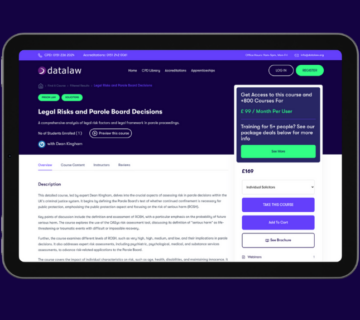Navigating the complex landscape of parole reviews, particularly when allegations arise, is a challenge that legal professionals and parole board members face with increasing frequency. The Worboys case, highlighted in a recent presentation by Dean Kingham of Reece Thomas Watson Solicitors and available on Datalaw’s platform, underscores the critical need for thorough inquiries and the implications of not doing so. The judgment in the Worboys case led to the Parole Board revising its approach to handling allegations, emphasising the importance of conducting detailed investigations to ensure that decisions are based on a comprehensive analysis of the offender’s behaviour and the potential risks posed.
Download our free “Parole Board Allegations Within Parole Reviews” E-Book
The Parole Board, acting as a quasi-judicial body, is tasked with balancing fairness to the prisoner with public safety considerations. This balance is delicately managed through policies that dictate how allegations should be handled, ensuring that decisions are made based on evidence and within the bounds of fairness and legality. The policies define what constitutes an allegation, how it should be investigated, and the importance of making findings of fact where possible, underscoring the significance of evidence-based assessments.
Datalaw’s “Parole Board Allegations Within Parole Reviews” course, designed for legal professionals involved in parole review processes, offers comprehensive training on navigating these challenges. The course provides insights into the legal framework governing parole reviews, the handling of allegations, and the implications for risk assessment and decision-making. Through expert guidance, participants will gain a deeper understanding of the principles at play, including the balance of probabilities standard and the procedural safeguards necessary to ensure fair consideration of allegations.
This course is essential for legal practitioners seeking to enhance their expertise in prison law and parole board proceedings. It equips participants with the knowledge and skills needed to effectively represent their clients and navigate the complexities of parole reviews, particularly when allegations are involved. By understanding the nuances of the Parole Board’s approach and the legal standards applied, practitioners can better advocate for fair and just outcomes in parole review cases.
For legal professionals interested in deepening their understanding of parole board reviews and the handling of allegations, Datalaw’s course offers invaluable insights and guidance. Visit Datalaw Online to learn more about the course and enrol.



